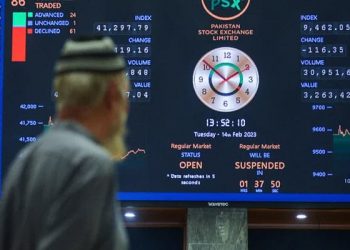Pakistan’s secondary market yields have recently garnered considerable attention following a significant drop observed in PKRV yields after a recent auction conducted by the central bank State Bank of Pakistan (SBP). The sudden decrease, up to 62 basis points (bps) in a single day, has sparked speculations about a potential rate cut.
YIELD DYNAMICS: A DETAILED ANALYSIS
The 3-month, 6-month, and 12-month yields witnessed declines of 52bps, 39bps, and 62bps, respectively, with the 12-month yield hitting its lowest level in over two years at 20%. Moreover, medium (5-year) and long-term (10-year) yields also saw decreases of 11bps and 6bps, respectively. The benchmark 6-month Karachi Interbank Bid and Offer rates also dipped by 21bps, underlining a robust shift in yields in the money market.
IMPLICATIONS FOR MONETARY POLICY: JUNE MEETING EXPECTATIONS
This significant pivot in yields has raised expectations of a rate cut in the upcoming Monetary Policy Committee meeting scheduled for June 10, 2024.
BEHIND THE SHIFT: INSIGHTS FROM T-BILLS AUCTION
The catalyst behind this shift was Wednesday’s T-Bills auction, which witnessed a surge in investor interest, with bids totaling a staggering Rs1.13 trillion for 1-year bonds. However, the central bank accepted only a marginal amount of Rs77 billion (6.81% of the bid), resulting in a 49bps drop in the cut-off yield for the 1-year tenure. Similar declines were observed in the 3 and 6-month tenure bonds.
INFLATION DYNAMICS: A KEY FACTOR
The momentum towards a transition in the country’s monetary policy is further fueled by a significant deceleration in inflation figures. Favorable base effects and reduced food prices contributed to a decline in the Consumer Price Index (CPI) for April 2024 to 17.3% year-on-year, with a monthly decrease of 0.4%.
INDUSTRY VOICES AND ECONOMIC REALITIES
Voices such as Arif Habib, founder of the Arif Habib Group, have advocated for an immediate reduction in interest rates to alleviate borrowing pressures on the business sector. Exporters and business representatives have echoed concerns over liquidity challenges and high operational costs stemming from the elevated policy rate.
BALANCING ACT: IMF’S PERSPECTIVE
To reignite growth across various sectors, the central bank may need to end its tightening cycle. However, the International Monetary Fund (IMF) emphasizes the importance of maintaining a tight monetary stance, urging caution and evidence of declining inflation, contained pass-through, and limited exchange rate pressures.



















